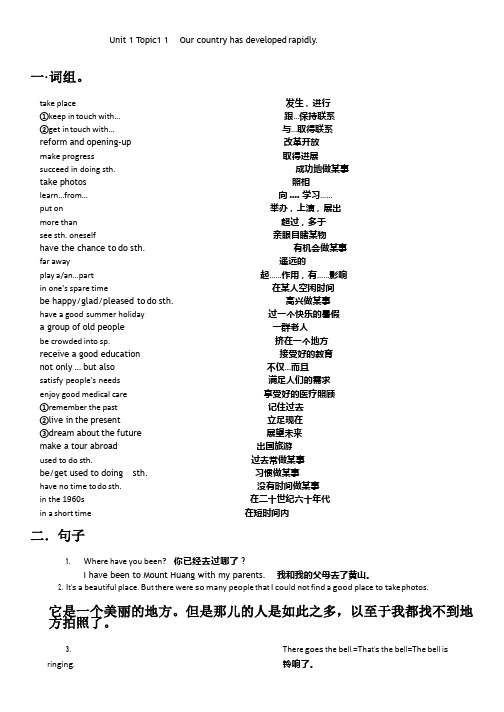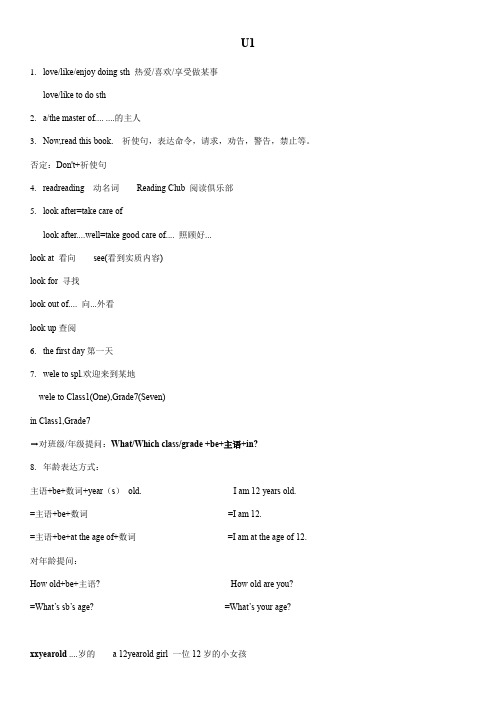牛津译林版七年级英语上册Unit1归纳知识点汇总
Unit1知识点梳理2023-2024学年牛津译林版英语七年级上册

第一讲 7A Unit1 Language Point 梳理一.Unit 1 重点语法1.would like / love sth.想要某物例句:Would you like some water?肯定回答:Yes, please. Yes, I’d like / love to.否定回答:No, thanks.2.would like / love to do sth.想要做某事例句:Would you like to drink some water?肯定回答: Yes, I’d like / love to.否定回答:I’d like / love to, but …… .3.糖葫芦形容词结构:数词+ 名词(单数) + (形容词)例:80foothigh 80 英尺高fiveinchtall 5英寸高的7yearold 7岁的注意:①名词必须用单数②只能放在名词前作定语,不能放在be 动词后作表语。
4.read/look/see/watch几个“看”的用法和区别:look 强调看的动作①系动词。
译作看起来,后接形容词。
She looks happy.②不及物动词。
译作看,词组:look at…,用副词修饰。
Tom looked at me angrily.see 及物动词,译作看到,无进行时态,强调看的结果。
watch 及物动词,译作观看,注视。
强调观看正在进行中的,发生变化的活动过程,常用于看电视、看球赛、看演出等。
read 及物动词,译作阅读。
强调看文字内容的东西,常用于看书、看报纸、看杂志等。
5.疑问代词what、which、who 及疑问副词how、when 、where可以和动词不定式连用。
what to do 做什么which to do 做哪个who to do 如何做how to do 谁做when to do 什么时候做where to do 在哪里做6.“疑问词+ to do” 结构经常放在know,learn,see ,ask等动词后做宾语。
初中英语牛津译林版七年级英语上册知识点第一单元

Unit 1 T opic1 1 Our country has developed rapidly.一·词组。
take place 发生,进行①keep in touch with…跟…保持联系②get in touch with…与…取得联系reform and opening-up 改革开放make progress 取得进展succeed in doing sth. 成功地做某事take photos 照相learn…from…向 .... 学习……put on 举办,上演,展出more than 超过,多于see sth. oneself 亲眼目睹某物have the chance to do sth. 有机会做某事far away 遥远的play a/an…part起……作用,有……影响in one's spare time 在某人空闲时间be happy/glad/pleased to do sth. 高兴做某事have a good summer holiday 过一个快乐的暑假a group of old people 一群老人be crowded into sp. 挤在一个地方receive a good education 接受好的教育not only … but also 不仅…而且satisfy people's needs 满足人们的需求enjoy good medical care 享受好的医疗照顾①remember the past 记住过去②live in the present 立足现在③dream about the future 展望未来make a tour abroad 出国旅游used to do sth. 过去常做某事be/get used to doing sth. 习惯做某事have no time to d o sth. 没有时间做某事in the 1960s 在二十世纪六十年代in a short time 在短时间内二.句子1.Where have you been? 你已经去过哪了?I have been to Mount Huang with my parents. 我和我的父母去了黄山。
Unit1重要知识点牛津译林版英语七年级上册

U11.love/like/enjoy doing sth 热爱/喜欢/享受做某事love/like to do sth2.a/the master of.... ....的主人3.Now,read this book. 祈使句,表达命令,请求,劝告,警告,禁止等。
否定:Don't+祈使句4.readreading 动名词Reading Club 阅读俱乐部5.look after=take care oflook after....well=take good care of.... 照顾好...look at 看向see(看到实质内容)look for 寻找look out of.... 向...外看look up查阅6.the first day第一天7.wele to spl.欢迎来到某地wele to Class1(One),Grade7(Seven)in Class1,Grade7➡对班级/年级提问:What/Which class/grade +be+主语+in?8.年龄表达方式:主语+be+数词+year(s)old. I am 12 years old.=主语+be+数词=I am 12.=主语+be+at the age of+数词=I am at the age of 12.对年龄提问:How old+be+主语? How old are you?=What’s sb’s age? =What’s your age? xxyearold ....岁的 a 12yearold girl 一位12岁的小女孩9.play+球类运动play footballplay the+乐器名词play the piano10.after class/school/lunch....11.be from=e from 来自Where +be+主语+from?=Where+助动词+主语+e from?12.be good at (doing ) sth=do well in (doing) sth 擅长做某事(=do sth well)13.★Be动词的一般现在时14.at the age of... 在...岁时15.go walking➡go+ving=go for a walkgo swimming=go for a swim16.glad/nice to meet you. ➡It's glad/nice to meet you.It’s+adj.+to do sth做某事....17.I see.我明白了。
牛津译林版七年级英语上册Unit1词汇语法知识点汇总(附综合检测卷)

牛津译林版七年级英语上册Unit1词汇语法知识点汇总Unit 1 This is me知识精讲必背词汇age n. 年龄cute adj. 可爱的;讨人喜欢的hobby n. 业余爱好dancing n. 跳舞,舞蹈swimming n. 游泳master n. 主人;大师grade n. 年级student n. 学生reading n. 阅读classmate n. 同班同学slim adj. 苗条的over 在……上classroom n. 教室二、重点词汇1. master noun & verb /ˈmɑːstər/1). n. a person who is very skilled in a particular job or activity大师,名家;专家例句:He was a master of disguise.他是个伪装大师。
This painting is clearly the work of a master.这幅画显然是名家的作品。
2). v. to learn how to do something well精通,掌握例句:She lived in Italy for several years but never quite mastered the language. 她在意大利住了好几年,但一直没怎么学好意大利语。
He quickly mastered the art of interviewing people.他很快就掌握了采访的艺术。
2. member noun /ˈmembər/1). a person, animal, or thing that is part of a group成员,一分子例句:The lion is a member of the cat family.狮子是猫科动物。
Representatives of the member states will be meeting next week.成员国代表将于下周会晤。
牛津译林版七年级上册英语Unit1知识点总结

牛津译林版七年级上册英语Unit1知识点总结Unit 1 This is me!1.How to look after your e-dogIf you want to take care of your electronic dog。
you need to know how to do it。
"How to" is a n word followed by an infinitive verb。
"Look after" means to take care of something or XXX.2.Good evening.Good evening" XXX。
It is different from "good night," which is used when XXX.3.XXXIf you enjoy playing football after school。
you can say that you love it。
"Love/like doing something" XXX。
while "love/like to do something" emphasizes a one-time n.For example。
"She loves watching TV。
but today she loves to listen to music." "Love" can be used as a verb to mean "like" or "enjoy," as in "He loves his parents" or "She loves music." It can also be used as a noun to mean "n" or "beloved," as in "a mother's love for her children" or "fall in love with XXX."nally。
牛津译林版七年级上册英语Unit1知识点汇总

牛津译林版七年级上册英语Unit1知识点汇总7A Unit 1 This is me!一.【精选短语】1. how to look after your e-dog如何照顾你的电子狗(1)疑问词+动词不定式(2)look after=take care of 照顾,照料2. Good evening.晚上好。
(晚上见面问候语)→比较:Good night.晚安。
(晚上分别时用语)3. love playing football after school喜爱放学后踢足球【知识链接】Love/like doing sth.喜欢做某事,强调习惯上的喜欢;Love/like to do sth.强调的是某一次的行为。
e.g. She loves watching TV, but today she loves to listen to music. Love的用法⑴vt.喜爱e.g. ①He loves his parents. (不能用like代替love)②She loves music.她爱好音乐。
⑵vt.热爱e.g. We love our motherland.我们热爱祖国。
⑶n.爱;挚爱a mother’s love for her children母亲对孩子的爱②fall in love with sb爱上…,e.g. He fell in love with her.③我们可在书信的结尾处看到例如Love Mary这样的署名,意思是With my love, Mary,一方面表示情感,一方面表示道别。
【用法拓展】lovely美丽的;可爱的e.g. lovely hair秀发,a lovely girl美丽的少女4. be good at sth/doing sth=do well in sth/doing sth擅长;在某方面表现好【知识链接】⑴He is good at telling funny jokes.⑵She always does well in English.5. wear glasses戴眼镜→ wear后接服装、装饰品等,表示“穿、戴”。
初中英语 牛津译林版七年级上册 Unit 1知识点详解
牛津译林版七年级英语上册Unit1知识点归纳词汇:1. glad adj. 高兴的,近义词:happy ,pleased 等Eg :Glad to see you . = Nice to see you. = Pleased to see you. 见到你很高兴。
(回答)Glad/Nice/ Pleased to see you, too.2. cute adj. 可爱的,讨人喜欢的。
近义词:lovely,clever,pretty等。
3. glasses n.(复数)眼镜。
A pair of glasses 一副眼镜【知识拓展】:glass : “玻璃”不可数名词。
“玻璃杯”可数名词。
短语归纳1、look after / take care of 照顾2、on the first day 在第一天3、Class 1,Grade 7 7年级1班4、play football 踢足球5、after school 放学后6、be /come from 来自7、be good at / do well in 擅长8、fly kites 放风筝9、tell sb. about sth. 告诉某人关于某事10、listen to music 听音乐11、play a game 玩游戏12、wear glasses 戴眼镜13、at school 在学校14、all the lessons 所有的课程15、talk about 谈论16、need to sth. 需要做...... 17、a lot of hobbies 许多爱好18、get to know 认识19. the same as 和......一样20. use...to do sth. 用......做某事21. live with ... 和......住一起词汇用法区别:1.love, like & enjoy2. read, look, see , watch, look at, have a look at本单元应该掌握的句子:1.What’s your name?你叫什么名字?2.Nice to meet you! 很高兴见到你。
牛津译林版七年级英语上册unit1重点语法归纳.doc
牛津译林版七年级英语上册unit1重点语法归纳初一大家开始系统的学习英语知识,英语知识点众多,大家在学习的时候要学会归纳和总结,这样才能取得举一反三的学习效果,下面为大家带来牛津译林版七年级英语上册unit1重点语法归纳,希望对大家学好初中英语有所帮助。
学习带有be动词和do动词的一般现在时。
一般现在时:阐述一般的客观事实;目前存在的事实;经常的习惯性的动作。
(1)当主语是第三人称单数时:肯定句:主语+is+其他/主语+动词的等三人称单数形式+其他。
如:He is kind. Nancy lives in Nanjing.否定句:主语+isnt+其他/主语+doesnt+动词原形+其他如:He isnt a student. Nancy doesnt live in Nanjing.疑问句:Is+主语+其他/Does+主语+动词原形+其他如:Is she your mother? Does Nancy live in Najing?(2)当主语不是第三人称单数时:肯定句:主语+am/are/动词原形+其他如:I am a boy. They like apples.否定句:主语+am not/are not+其他/主语+dont+动词原形+其它如:They dont like apples. They are not friends.疑问句:Am/Are+主语+其他Do+主语+动词原形+其它如:Do they like apples? Are they good students?牛津译林版七年级英语上册unit1重点语法归纳为大家带来过了,英语的学习重在掌握知识点,希望大家能够熟练掌握上面的内容,这样大家的英语成绩就能迅速提升。
牛津译林版七年级英语上册Unit-1单元知识点归纳
牛津译林版七年级英语上册Unit 1 This is me一.Comic strip- Reading(一)重点短语、交际用语1.read this book 读这本书2. look after 照顾,照看3. play football 踢足球4. after school 放学后5. be from 来自......6. be good at 擅长7. good morning 早上好,上午好8. good afternoon 下午好9. good evening 晚上好10. What's your name? 你叫什么名字?11. Nice to meet you. 见到你很高兴。
12. Nice to meet you too. 见到你也很高兴。
(二) 语言知识梳理1. Oh, I love e-dogs. 哦,我喜爱电子狗。
【知识点1】love 的用法句中的love 是实义动词,表示“喜爱,热爱,喜欢”,love 有强烈的感情色彩,相当于like...very much, 其后可以直接接名词、代词、动名词或动词不定式做宾语。
例如:We should love the students. (接名词)我们应该关爱学生。
Do you love me, mom? (接代词)妈妈,你爱我吗?My friend Bill loves to listen to music. (接不定式)= My friend Bill loves listening to music. (接动名词)我的朋友比尔喜爱听音乐。
【知识拓展】love 做名词的用法love 本身也可做名词,表示“爱”。
例如:My mother's love for me is very deep. 妈妈对我的爱是很深的。
【知识点2】e-dog 的含义e-dog 做名词,是由electronic, dog 两个单词合并而成的,electronic 可译为“电子的”。
牛津译林版七年级上册英语Unit1语法总结
牛津译林版七年级上册英语Unit1语法总结1. 一般现在时一般现在时表示经常性、惯性或普遍性的动作或状态。
其构成为:主语 + 动词原形 (+ 其他补充成分)。
例句:- I play basketball every day.(我每天打篮球。
)- She likes reading books.(她喜欢读书。
)2. 句型:主语 + be + 形容词这种句型用来表达主语的状态或特征。
例句:- The weather is sunny today.(今天天气阳光明媚。
)- He is tall and handsome.(他又高又帅。
)3. 一般过去时一般过去时用来表示过去某个时间发生的动作或存在的状态。
其构成为:主语 + 动词过去式 (+ 其他补充成分)。
例句:- They went to the park yesterday.(他们昨天去了公园。
)- We lived in Shanghai five years ago.(我们五年前住在上海。
)4. 句型:主语 + be + 动词-ing这种句型用来表示主语正在进行的动作。
例句:- I am studying English now.(我现在正在研究英语。
)- They were playing soccer in the park yesterday.(他们昨天在公园踢足球。
)5. 一般将来时一般将来时用来表示将来某个时间将要发生的动作或存在的状态。
其构成为:主语 + will + 动词原形 (+ 其他补充成分)。
例句:- We will have a party next week.(下周我们将举行一个派对。
)- She will visit her grandparents tomorrow.(她明天将去看望她的祖父母。
)6. 句型:主语 + be + going to + 动词原形这种句型用来表示主语打算或计划将要发生的动作。
例句:- I am going to meet my friends this afternoon.(今天下午我将去见我的朋友。
- 1、下载文档前请自行甄别文档内容的完整性,平台不提供额外的编辑、内容补充、找答案等附加服务。
- 2、"仅部分预览"的文档,不可在线预览部分如存在完整性等问题,可反馈申请退款(可完整预览的文档不适用该条件!)。
- 3、如文档侵犯您的权益,请联系客服反馈,我们会尽快为您处理(人工客服工作时间:9:00-18:30)。
牛津译林版七年级英语上册Unit1归纳知识点汇总
一、单词短语
1.love比like程度更深
love doing/to do sth. loving doing多表示一贯的爱好,而love to do则多表示具体喜欢做的一件事。
enjoy doing sth (enjoy 译为喜欢,只能加doing)
2.What's your name ? 回答:My name is .../ I’m....
询问名字的方法还有:May I have your name ?/ Can you tell me your name ?
3.master主人one’s master = the master of sb 某物或某人的主人Master(硕士)
4.
5.How to look after your e-dog.如何照顾你的电子狗。
疑问词+ 不定式(to do)如:I don’t know what to eat.
look after=take care of照顾;照料I can look after myself.我能照顾我自己。
look after sb well = take good care of sb 照顾好某人
look for 寻找look at 看。
look like 看起来像
look out 小心(=Be careful! / Take care)look out of 朝...往外看look the same 看起来一样6.The new students in Class 1, Grade 7 at Sunshine Middle School are greeting each other.
Class One Grade Seven 由小到大,都要大写
用法相同的还有number ,lesson,unit,group,room
I’m in Grade 7.(对划线部分提问)
What/ Which grade are you in?
Our school has six grades.我们学校有6个年级。
(*此时grade 不需要大写)
each other 彼此,相互We should help each other.我们应该互相帮助。
7. Let’s meet them.我们见见他们。
let sb. do sth让某人做某事Let me help you.让我来帮助你吧。
8.I often play football after school.我经常在放学后踢足球。
play football/basketball/volleyball......玩球类运动不能加定冠词the
play the guitar/violin....玩乐器前加定冠词the
after school 放学后after class课后after class 下班后
9.He is from Nanjing.他来自南京。
be from=come from
His friend is from Beijing=His friend comes from Beijing. 一句话中不要同时出现be 、come from 10.He is good at Maths.他擅长数学。
be good at=do well in +sth/doing sth在......方面擅长,后面如果是动词,用动名词的形式
Yao Ming is good at playing basketball.=Yao Ming does well in playing basketball.
be good for 对...有益be good to sb 对...友好的= be kind to sb= be nice to
11.over there 在那里
over 在...正上方
over 越过 a bridge over the river河上的一坐桥
over 超过There are over 50 boys in the classroom.
over 结束= end
12.Age年龄
问年龄:How old is he? / What’s his age ?
回答:He is 13 years old ./ He is at the age of 13./ He is at age 13 .
13.I see. 我明白了。
14.Listen to 和hear listen to 强调尽量听清hear强调听到的结果
15. Hello, everyone!
Everyone in my class wants to study English well.
everyone为不定代词,在句中用作单数,谓语动词要用第三人称单数形式。
every one of
16.wear和put on的比较
wear:穿着,戴着;表示穿得状态,后面接穿戴的东西。
He often wears his glasses.
Put on:穿,戴;表示穿的动作,后面接穿戴的东西。
He put on a coat and went out.
17.teach sb sth teach sb to do sth
18.Welcome home. (home ,here,there,where不加介词)
19.be late for sp = go to sp late
二、语法:
一般现在时
表示事物或人物的特征、状态。
如:The sky is blue.天空是蓝色的。
表示经常性或习惯性的动作。
如:I get up at six every day.我每天六点起床。
表示客观现实。
如:The earth goes around the sun.地球绕着太阳转。
构成:
1.含有be动词:主语+be(am,is,are)+其它。
如:
2.不含有be动词,只有动词:主语+行为动词(+其它)。
3.否定句、一般疑问句、特殊疑问句:
(1)有be动词的变化
否定句:be动词后+not 如:He is not a worker.他不是工人。
We are not friends.
一般疑问句:be 动词提前如:Is he a worker? ---Yes, he is./No, he isn’t..
特殊疑问句:疑问词+一般疑问句。
如:My coat is behind the door. (对于划线部分提问) Where is my bike?(2).行为动词的变化。
否定句:主语+ don't( doesn't ) +动词原形(+其它)。
如:I don't like bread.
当主语为第三人称单数时,要用doesn't构成否定句。
如:He doesn't often play.
一般疑问句:Do( Does ) +主语+动词原形+其它。
如:- Do you often play football? - Yes, I do. / No, I don't.
当主语为第三人称单数时,要用does构成一般疑问句。
如:
- Does she go to work by bike?- Yes, she does. / No, she doesn't.
特殊疑问句:疑问词+一般疑问句。
如:
My father goes to work by bus.(对于划线部分提问)
How does your father go to work?
4.动词变为第三人称单数形式的规则:
①一般情况下,在动词的后面直接加s。
如:read--reads make—makes write—writes
②以字母s, x, o , sh , ch结尾的动词,在词尾加es。
如:do—does wash—washes teach—teaches
③以辅音字母加y结尾的动词,要把y变为i,再加es.如:study--studies
④特殊变化:have--has
注意:在一个第三人称单数的句子中,只要句子中出现了does或者其否定形式doesn’t.该句子中的其他动词就要使用原形。
